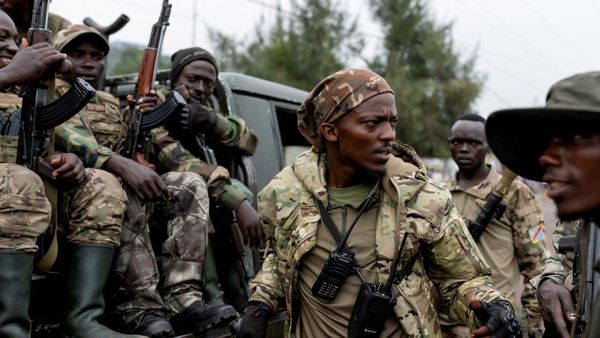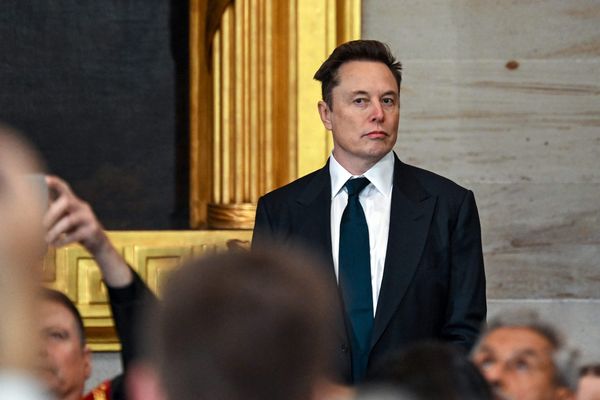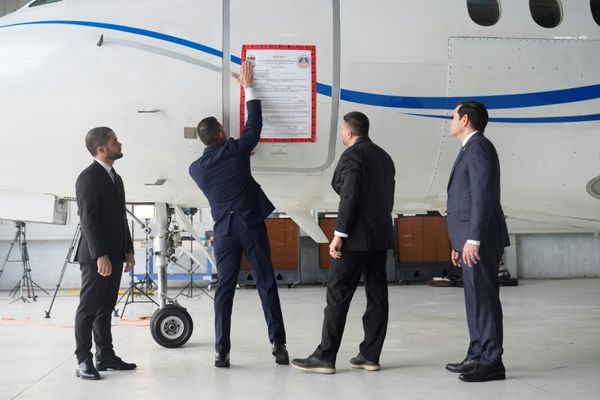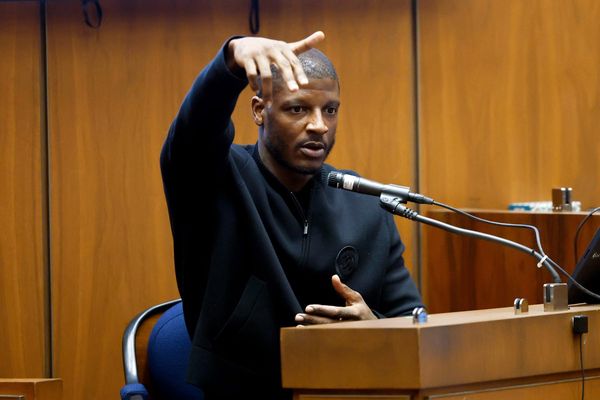
Millionaire fashion designer Patrick Henry’s work well and truly precedes itself.
You may not know his name, but you’ve definitely seen his ‘fits. From The Weeknd’s famous red suit to Lena Waithe’s boldest red carpet ensembles, Henry—who goes by the name Fresh—has created some of the most sought-after suits of the last decade.
A triumph, considering that same decade was Fresh’s self-confessed “rock bottom”, peppered with tragedy, stints of addiction, and homelessness.
But we’ll get to that soon enough.
Long before he was dressing the likes of John Legend, Billy Porter, Justin Bieber, Gabrielle Union, Blake Griffin and Diddy, you see, Fresh had no aspirations of the sort. He began teaching himself how to sew at 13 after a cheerleader told him most girls liked bad boys, athletes, or boys that dressed well. “All the things that I wasn’t,” he laughs, “but I thought, well s**t, maybe I can figure the last one out.”
By the time he graduated high school, he was obsessed. His parents? Less so.
“When I told them I wanted to do fashion, they lost their minds. Told me to get a real job, but fashion was the realest thing to me,” he shrugs. Against his parents wishes, he turned down scholarships to pursue a more traditional education and decided to start doing alterations out of his apartment.
As word of mouth grew and dry cleaning businesses started to outsource their alterations to him, Fresh realized he may be able to make more money by opening a dry cleaners of his own.
“It was the first and last storefront I’ve had,” he admits. “Part of me thinks it was the worst move, because I didn’t know anything about dry cleaning, but it was also the best move, because it taught me so much. It taught me to focus on my skills.”
After closing the storefront at 24, Fresh moved to New York to capitalize on the city’s fashion heritage as a tailor, but found himself back in Memphis not too long after.
“My daughter’s mom moved, so I had to raise her on my own, then my brother lost his job, so it was just the three of us sharing this 300 square foot apartment. Depending on me,” he takes a deep breath.
Fresh wondered if there might be a better quality of life and more opportunities on the West Coast so, with $500 and no prospects, the trio embarked on a three-day road trip to San Diego.
“I started my alterations business back up the second we arrived,” he says, “and that’s actually how I got into doing custom clothes.”
As the level of trust grew between Fresh and his new clients they began coming to him with higher-value alteration jobs, like full recuts of Armani suits. Only, they were also laughing in his face when it came to pay what he assumed was an expensive bill.
“It made me think, if I’m fixing people's $3,000 suits, I could probably make them. I’m determining what it's going to look like, so why not do it from the onset?” he says.
Still, it wouldn’t come easy. His growing professional success was spiked by personal trauma; his father passed away unexpectedly, his daughter went to live in New York with her mother, and a hopeful move to Los Angeles quickly thrust him into cycles of drink and drug abuse.
“I was mad depressed,” he admits, “and the business I built just deteriorated. Just...deteriorated.
“On the last leg of it, I had a pretty rich client, Vince, and he asked me to do all these suits, so I used up almost all the money I had at the time to make them—$7,500— thinking I’d get about $15,000 back. Not $1 of it ever showed up.”
With almost no money left, Fresh was forced to sleep in a homeless shelter, where his addictions hit fever pitch. “You know, I’m spending $13 a day to stay in a shelter, next to junkies and bums, and I’m like, how did this happen? I have nice clothes. I don’t fit the mold.
“But I did. I was still drinking. If I could find some coke, I was gonna do it. I had a poor man’s mentality.”
After three months, Fresh made his final call to Vince’s voicemail demanding the money he was owed. “The second I hung up, God spoke to me,” says Fresh. “He told me I wasn’t going to get out this way, and if I continued to cuss people’s voicemails out I’d be here forever.”
Over the next few nights, Fresh had vivid dreams of a future where he was successful, happy, and told himself if it was that easy to imagine, he had no reason to feel depressed about his current circumstances.
From that moment he gave up all drink, all drugs, and got to work on developing a defining characteristic that would set his suits apart from others produced and manufactured in LA, allowing him to charge more and, crucially, offering more value.
When he started designing stripe-splashed athleisure and posting them to Instagram, where he claimed he was a celebrity tailor, custom commissions started rolling in.
“I was out of the shelter after a few weeks. In a POS AirBnB but still,” he laughs, “out.”
Twelve months later Richfresh made its first million dollars. Thanks, in large part, to an unexpected chat with an Uber driver.

“I didn’t have a car so had to take Uber everywhere, and one day I was talking to this driver about trying to find a local factory for good fabrics, but everyone I was contacting didn’t take my business seriously, and he said he knew somewhere that did an amazing suit for his cousin but couldn’t remember the name.”
Unexpectedly, the driver cancelled Fresh’s trip and drove him around LA for 45 minutes until he found the factory.
“I walked right in and there were tailors everywhere,” he says. “It was the most beautiful thing I’d ever seen.”
On a whim, Frresh decided to shift the model he’d followed for years and—instead of designing and cutting everything himself, limiting how much he could sell—hired the factory’s tailors to manufacture all future creations under his watchful eye.
A year on, he bought the factory outright. “Those track pants, and those tailors, changed my life. It was a magical time.”
Fresh then shifted his focus onto building his celebrity client list throughout 2019, knowing big names beget bigger names. He reached out to the personal stylists of the names on his to-dress list and, by the end of the year, scratched most of them off.
Then, as Covid-19 started creeping into the lexicon, those long-anticipated A-list names started pulling out of meetings, one after the next.
“I didn’t know what was happening,” he says, rubbing his hand on his forehead. “I had my factory, my house in the Hills, my Maserati...then everything just stopped. Everything was at risk.”
In the first six months of international lockdowns, Fresh didn’t make $1 from Richfresh.
“I didn’t panic but I knew we were going to need to reset, and my brother [Chase Morgan]—who I had moved to LA to run my factory—kept saying I needed to make masks. I was like, dude, no,” he shakes his head, smiling. “I’m not going from making super-expensive, luxury suits to face masks.”
When his employees and friends started sharing concerns over the declining availability of face masks across the US, however, Fresh started toying around with designs and implemented a philanthropic purpose to the origami-shaped masks that resulted.
As a way to meet the demands caused by the pandemic, the brothers co-founded HENRY Masks, pledged to donate one mask to front line workers, medical workers and families in need every mask sold, and they flew off the shelves.

In mere weeks, HENRY could count Jennifer Lopez, LeBron James and Doja Cat among its clients, as well as Grammy’s staff, Megan Thee Stallion’s dancers and more.
Without any outside funding, the company made $1 million and created over 60 jobs in just five months.
Of course, as regulations around wearing face masks are being abolished both nationally and internationally, long-term growth won’t be sustained on face masks alone. And Fresh is, per usual, thinking ten steps ahead.
“The next step is evolving HENRY into a CPG brand,” he says. “Offering people the best versions of things they need consistently—soaps, tissues, wipes, you know—things you can’t live without. Why would I use anyone else’s lifestyle product if I could make one that is good, does good, and makes people feel good?”
Not that he’s going to put Richfresh on the backburner any time soon. As the world enters the ‘new normal’, the demand for Fresh’s custom suits is reaching new heights; best exemplified by Justin Bieber’s iconic peach suit in his new video for “Peaches”, which Fresh made in just two days.
“That's where my heart is. I'm still a creative, I'm still an artist, and I get to be a kid over here,” he smiles. “With HENRY, I've got to be more responsible, be thinking about what other people need, with Richfresh, it’s just based on what I feel like showing the world.”
I can’t help but ask: “You think Vince is kicking himself for not spending that $15,000 on the originals?”
Fresh laughs. “I’m so grateful for all of my experiences, good and bad. If God asked me if I’d do it all again, with the same sh**ty a** experiences, I would say ‘yes sir!’
“Vince is the celebrity that changed my trajectory. He's the one. He taught me that no celebrity is gonna fall out the sky, and make me somebody, I got to do it myself.
“You know, so, shout out to Vince,” he laughs, throwing deuces to the sky.








